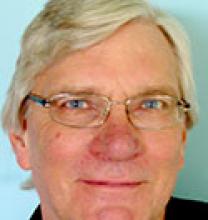Before things “broke badly” for the actor Bryan Cranston, he was in a great family TV show called Malcolm in the Middle. If you’ve seen it, you will remember the catchy theme song with the refrain, “You’re not the boss of me now . . . and you’re not so big.”
I thought about this as I reflected on Ike Glick’s feature article, “Breaking the peace,” on page 4. Often our first response to disagreement is, “Who made you the boss over me!” Even in the church, even among committed Christians, this is something that bubbles to the surface. We espouse community, consensus and good healthy conversation; however, our actions often overtake our values and beliefs.
How do we lead well and encourage healthy, dynamic leadership in the “Jesus way”? What do we do when God’s people disagree? These are perennial questions for the church. Over its 2,000-year history, the tendency to move from servanthood to power-based leadership has been a common theme, as Glick points out. Conflict over theological concepts is nothing new, but there are also profound movements through the last two millennia that have rediscovered leadership from below and within, and have found common ground amid disagreement.
The Desert Fathers and Mothers left behind the hierarchy of the church to imagine new ways of living faithfully with God. St. Francis called the church to humility and servanthood. The Anabaptist leaders called Christians back to community and the giving up of physical force to change people’s minds. Later followers of Jesus, like the Quakers, early Pentecostals and liberation theologians, gave power back to their communities. The New Monastics are examples of how the church has never been satisfied with the status quo.
Our history as Mennonite Anabaptists is littered with the debris of conflicts. And yet there have also been profound healing and renewal through time and through the Spirit’s nudging. Acts of repentance between ancestors of the Reformed church and Anabaptists in Switzerland, ongoing conversations between Catholic and Mennonite theologians, and Mennonite denominations coming together, all point to ways in which overwhelming disagreements have found reconciliation.
In this time we again are engaged in disagreement over God’s intentions for us as Jesus’ followers, and how to live faithfully. I would suggest that we can learn from our past that reconciliation is possible in the midst of disagreement, and that Jesus’ call to servant leadership is a viable option in the midst of differing understandings. In our history we have learned skills in building consensus and moving towards common ground. These include:
• Listening carefully to each other’s stories and history. Theological positions and understandings cannot be separated from who we are and how we have come to be. Listening is much more significant than defending our own po-sitions on various theological points.
• Assuming good will in the other is a core value in finding common ground. In difficult conversations it is important to take seriously the other’s commitment to Christian faith, and that they, too, are Spirit-filled and longing to live faithfully.
• Recognizing that there are genuine differences in understanding for what it means to be faithful disciples of Jesus. The question then becomes not who is right, but how do we live together with differing understandings of what the Spirit is saying.
• Building consensus takes patience. Jesus did not coerce his followers or his enemies, but was always inviting. This form of leadership takes time. In a great book, Living Gently in a Violent World by Stanley Hauerwas and Jean Vanier, Hauerwas writes: “Gentleness is a vital dimension of the kingdom of God, but it is a learned skill that requires work and demands patience, slowness and timefulness. Such work means that we have to become ‘friends of time,’ a patient people who recognize that ‘we have all the time we need to do what needs to be done.’ ”
I know we long to make things work out and to do it quickly; however, I would suggest that the way of Jesus—the way of suffering, self-giving love; the way of
servant leadership—is one that takes time, patience and grace, and that we do have “all the time we need to do what needs to be done.”
Henry Krause is the pastor of Langley Mennonite Fellowship, B.C., and continues to strive towards the goal of being a faithful servant leader. If only it didn’t take so long to learn how to do it well!
—Posted Jan. 28, 2015




Add new comment
Canadian Mennonite invites comments and encourages constructive discussion about our content. Actual full names (first and last) are required. Comments are moderated and may be edited. They will not appear online until approved and will be posted during business hours. Some comments may be reproduced in print.